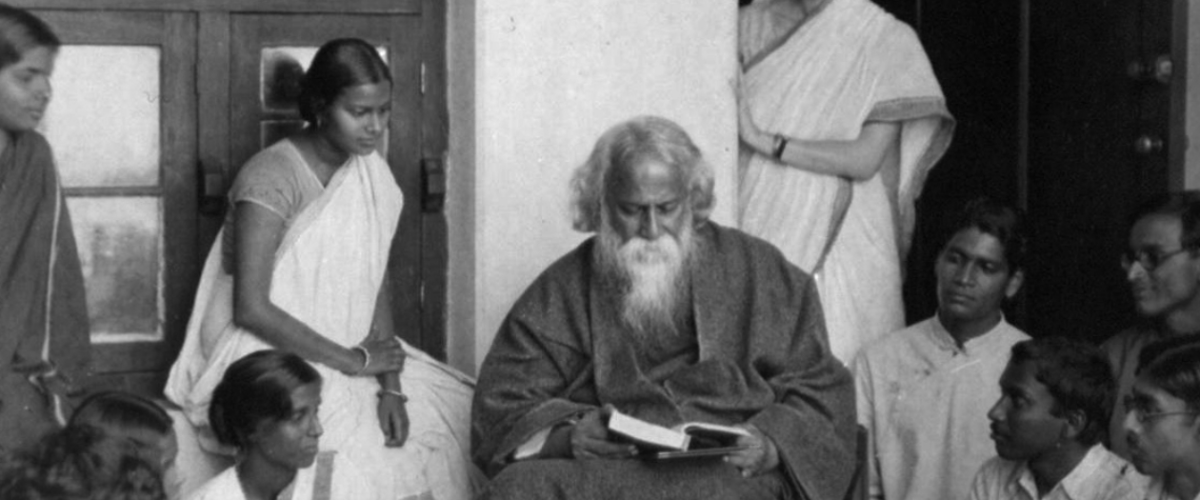

Born in 1861 in Calcutta (now called Kolkata), Rabindranath Tagore was the most outstanding polymath of his age. In the West he is mainly celebrated as a poet - he began writing poetry at the age of 8, and in 1913 became the first non-European to win the Nobel Prize for Literature.
He introduced new forms of prose and verse in colloquial Bengali, hence freeing it from the purist constraints of the Sanskrit style. Even so, it is his contribution to Indian music that has had an even more profound and long-lasting influence on the cultures of Bengal and Bangladesh.
Tagore’s songs are widely popular and his impact on Indian culture is often compared to that of Shakespeare in the English-speaking world. He was a multilingual, multi-faceted genius – painter, mystic, poet, novelist, essayist, philosopher and musician – and gave both India and Bangladesh their national anthems (and the Sri Lankan national anthem was written by his pupil).
Tagore composed over 2,000 songs, collectively known as Rabindrasangeet, merging the vivid fluidity of his prose and poetry into a kind of lyricism that runs the entire gamut of human emotion, ranging from sombre devotional hymns to overtly romantic and quasi-erotic compositions. For the people of Bengal, Rabindrasangeet remains his largest single achievement and there isn’t a Bengali home in which his songs are not sung.
Heavily influenced by the North Indian thumri style of song, and focusing mainly on melody and words – some would say words set to melody – Tagore’s music emulates the tone of Indian classical raags (melodic structures) with a poetic flair that adds a new emotional twist whilst also seamlessly merging many raags into a coherent musical form that sounds antiquated yet refreshingly new.
There have been numerous scholarly attempts to analyse the raag component and its specific treatment in Rabindrasangeet. But Indian classical raags were not his only source of inspiration.
Tagore also produced a substantial body of work consisting of tunes drawn from Western music, given an Indian treatment, along with musical elements drawn from Bengali folk music (specifically the music of the Baul mystics) as well as other parts of India. Whilst reading Law at the University of London, he had been very impressed with sprightly English, Scottish and Irish folk tunes many of which are discernible in some of his compositions.
Tagore’s music has had a profound influence on leading Indian classical maestros of our time including the sarod players Ustad Amjad Ali Khan and Pandit Buddhadev Dasgupta as well as sitar maestro Ustad Vilayat Khan. Between 1878 and 1932, he visited more than 30 countries on five continents. He repudiated his knighthood 1919 (awarded by King George V four years earlier) as a protest against the Jallianwallah Bagh Massacre, where British had shot indiscriminately into a crowd, killing more than 1,200 men, women and children.
Listen to the music | An early recording of Tabu Mone Rekho, sung by Tagore himself.
Jameela Siddiqi is an author, linguist, and BBC cultural commentator, specialising in postcolonial fiction and the devotional music of South Asia.
Darbar believes in the power of Indian classical music to stir, thrill, and inspire. Explore our YouTube channel, or subscribe to the Darbar Concert Hall to watch extended festival performances, talk and documentaries in pristine HD and UHD quality.
A distinguished lineage of instrumentalists descends from India's most renowned classical music maestro of the 20th...
Read More 
Swami Haridas, a mystic-musician and renowned guru of the early 16th century, is thought to have had an innate...
Read More 
It is generally believed that Indian classical music has its origins in the religious observances of the Aryan people...
Read More 
The beginner's guide to Indian classical music. Whether you’re completely new to raga music or just need a refresher, we’ve put together this brief overview of all things raga music to help you feel at ease when visiting one of our concerts or watch our videos on our YouTube or our Darbar Concert Hall.
Keep up to date with the latest news, events, music and musings across our social channels
For hundreds more clips and shorts, vist our YT page here 